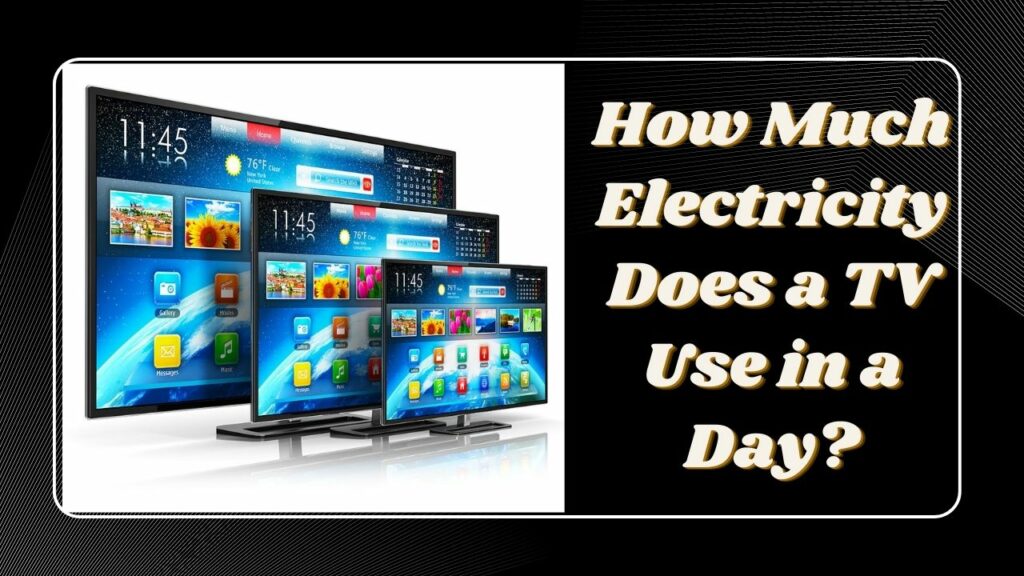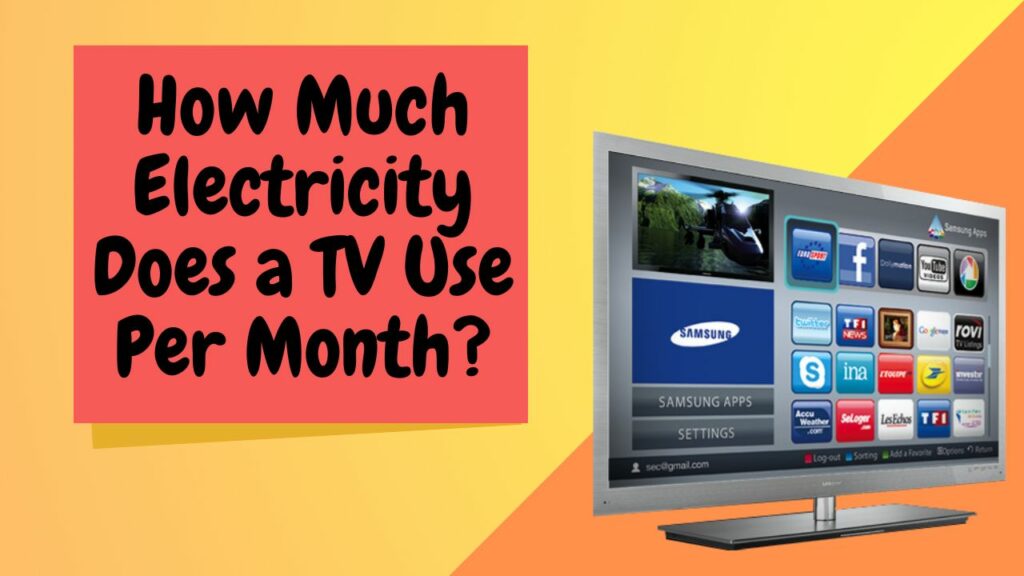As technology continues to advance, people are increasingly becoming reliant on electronic devices such as televisions. TVs are widely used for entertainment and keeping up with the latest news and events. However, as much as they bring convenience to our lives, they also consume a considerable amount of electricity. This article will cover how much electricity a TV use, including the amount of electricity it uses in a day, per hour, and per month.
What Determines How Much Electricity Does a TV Use?
Before we delve into the amount of electricity a TV uses, it’s important to understand the factors that determine the amount. The size of the TV, its resolution, and the type of screen it has all affect its energy consumption. Additionally, modern models are more energy-efficient than earlier generations.
How Much Electricity Does a TV Use in a Day?

The amount of electricity a TV uses in a day depends on several factors, including the number of hours it’s on and its wattage. Here are the steps to calculate how much electricity a TV uses in a day:
Step 1: Check the TV’s Wattage
The wattage of a TV is usually indicated on its label or manual. Check for this information before proceeding with the calculation.
Step 2: Calculate the TV’s Daily Energy Consumption
Multiply the TV’s wattage by the number of hours it’s on in a day. For example, if your TV is 200 watts and is on for 5 hours a day, its daily energy consumption will be 1000 watt-hours or 1 kilowatt-hour (kWh).
Step 3: Find Your Electricity Rate
Your electricity rate can be found on your electricity bill. It’s usually indicated in cents per kilowatt-hour.
Step 4: Calculate the Daily Electricity Cost
Multiply the daily energy consumption by your electricity rate. For example, if your electricity rate is 15 cents per kWh, the daily cost of running your TV will be 15 cents.
Step 5: Consider Your Monthly Electricity Bill
Multiply the daily cost by the number of days in a month to get the monthly electricity cost of running your TV.
Step 6: Determine the TV’s Annual Energy Consumption
Multiply the daily energy consumption by 365 days to get the TV’s annual energy consumption.
Step 7: Calculate the Annual Cost
Multiply the annual energy consumption by your electricity rate to get the annual cost of running your TV.
How Much Electricity Does a TV Use Per Hour?
If you’re concerned about how much electricity your TV is using, it’s important to consider all aspects of your entertainment setup, including your TV remote and any potential issues with a broken TV screen. By understanding how TV remotes work and what to do if you have a broken screen TV, you can take steps to reduce your energy usage and ensure your TV is functioning properly. The amount of electricity a TV uses per hour depends on the TV’s wattage. Here are the steps to calculate how much electricity a TV uses per hour:
Step 1: Check the TV’s Wattage
As mentioned earlier, the TV’s wattage is usually indicated on its label or manual. Check for this information before proceeding with the calculation.
Step 2: Divide the TV’s Wattage by 1000
Divide the TV’s wattage by 1000 to convert it to kilowatts (kW).
Step 3: Calculate the Hourly Energy Consumption
Multiply the wattage of the TV by the number of hours it is on in an hour. For example, if your TV is 200 watts and is on for 1 hour, its hourly energy consumption will be 0.2 kilowatt-hours (kWh).
Step 4: Calculate the Hourly Cost
Multiply the hourly energy consumption by your electricity rate to get the hourly cost of running your TV.
How Much Electricity Does a TV Use Per Month?

To calculate the amount of electricity a TV uses per month, you need to know its wattage, the number of hours it’s on, and your electricity rate. Once you have this information, proceed as follows:
- Determine the TV’s Daily Energy Consumption: Multiply the TV’s wattage by the number of hours it’s on in a day to find out how much energy it uses each day.
- Find Your Electricity Rate: Check your electricity bill to find out how much you pay per kilowatt-hour.
- Calculate the Daily Electricity Cost: Multiply the daily energy consumption by your electricity rate to find out how much it costs to run your TV each day.
- Calculate the Monthly Electricity Cost: Multiply the daily electricity cost by the number of days in a month to find out how much it costs to run your TV each month.
For example: If your TV uses 100 watts and you watch it for 5 hours a day, the daily energy consumption is 500 watt-hours or 0.5 kilowatt-hours (kWh). If your electricity rate is 15 cents per kWh, the daily cost is 7.5 cents. Multiplying this by 30 (the number of days in a month) gives you a monthly cost of $2.25.
Keep in mind that this is just an estimate, and the actual cost may vary depending on the TV’s energy efficiency and usage patterns.
Conclusion
In conclusion, understanding how much electricity your TV uses can help you manage your energy consumption and save money on your electricity bill. By using the steps outlined in this article, you can calculate how much electricity your TV uses per month and make informed decisions about when and how long to use it. Additionally, investing in an energy-efficient TV or using a power strip to turn off your TV and other devices when not in use can further reduce your energy consumption and costs.
Remember, small changes in energy consumption can add up over time and make a big impact on both your wallet and the environment. So, take the time to calculate your TV’s electricity usage and consider making changes to reduce your energy consumption.
Frequently Asked Questions (FAQs)
Q.1 Does the size of the TV affect its electricity usage?
Yes, the size of the TV can affect its electricity usage. Generally, larger TVs use more energy than smaller ones because they require more power to run. However, newer models of larger TVs may be more energy-efficient than older models, so it’s important to consider the TV’s energy efficiency rating as well.
Q.2 Does turning off the TV save electricity?
Yes, turning off the TV when it’s not in use can save electricity. When the TV is turned off, it stops using electricity altogether. However, if you leave the TV on standby mode, it will continue to use some electricity even when it’s not being used.
Q.3 Can adjusting the TV’s brightness and contrast settings reduce its electricity usage?
Yes, adjusting the TV’s brightness and contrast settings can reduce its electricity usage. Lowering the brightness and contrast levels can decrease the TV’s energy consumption and save electricity. Additionally, using the “energy-saving mode” or “eco-mode” on your TV can also reduce its energy usage.